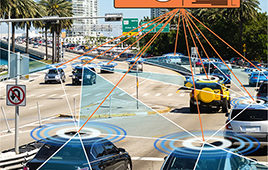Wii-like technologies may help stroke survivors improve communication skills
Motion sensing technologies, such as the Nintendo Wii Remote, could be used in the rehabilitation of people with aphasia ? a language impairment, commonly caused by a stroke, that affects around 250,000 people in the UK1.
The research is being carried out by a team at City University London, in collaboration with the Stroke Association and funded by the Engineering and Physical Sciences Research Council (EPSRC).
The aim is to develop an affordable, computer-based technology to help stroke survivors, who have limited spoken or written output, learn how to ‘gesture’ independently at home.
Gestures that can be readily interpreted by others are often advocated in aphasia treatment, but can be difficult for aphasic people to learn, because they have additional stroke-related disabilities, such as one sided paralysis. Gesturing can be improved through therapy, but one-to-one sessions can be costly and therapy resources are scarce.
The project will create a prototype system that enables users to practise gesturing, receive instant feedback, and master the movements through repetition. It will be run by a multi-disciplinary team from City’s Centre for Human-Computer Interaction Design (HCID), and Department of Language and Communication Science.
“Gesture tracking and recognition technologies are becoming a ubiquitous part of new computing and gaming environments, ranging from Apple’s touch-screen iPad through the hand-held Nintendo Wii Remote to Microsoft’s forthcoming Kinect for the Xbox 360, which will track users’ movements without the need for a handheld controller,” says Stephanie Wilson, Senior Lecturer in HCID at City University London. “Whilst popular in gaming, we will evaluate the suitability of such technologies in aphasia rehabilitation.”
Jane Marshall, Professor of Aphasiology at City University London, adds: “Computer-based treatments have been shown to improve verbal language skills in previous studies, but this is the first time that gestures will be addressed. With 45,0002 new cases in the UK each year, we hope that our work will help a wider range of aphasic people to regain communication skills.”
Dr Sharlin Ahmed, Research Liaison Officer at The Stroke Association, says: “Communication difficulties are the most frustrating disability that stroke survivors are left facing. This very exciting and intuitive project could go a long way towards helping breakdown some of the barriers of communication that people with aphasia have to tackle. 150,000 people have a stroke in the UK every year and the use of new technology could help them regain their lives, so The Stroke Association is very proud to be a part of this.”
The project ? known as Gesture Recognition in Aphasia Therapy (GReAT) ? will run for 18 months. It plans to test the prototype via 30 of the Stroke Association’s Stroke Clubs in the London area. Volunteers will use the system, explore its capabilities and report back to the project team, while workshops for aphasia therapists will explain how the system works and its potential benefits. People with aphasia will also be employed as consultants during the development of the technology, to ensure that it is fit for purpose.
Notes to Editors
References
Speakability, the national charity that supports and empowers people with aphasia, 2010.
Office of National Statistics, 2001.
About City University London
City University London is a principal provider of undergraduate, postgraduate, professional and vocational education in the United Kingdom. The University is committed to leading London in education, research and knowledge transfer for businesses and the professions and is renowned for its international focus and the employability of its graduates.
The University teaches across a range of subjects in arts including journalism and music, informatics, social sciences, engineering and mathematical sciences, business, law, health and community sciences.
The University attracts over 21,000 students from 156 countries, while teaching staff are drawn from nearly 50 international locations, ensuring that the University has a truly international outlook.
City University London was founded in 1894 as the Northampton Institute and was awarded full university status in 1966. Please see the following link for more information www.city.ac.uk.
About the Stroke Association
The Stroke Association is the only UK charity solely concerned with combating stroke in people of all ages. The charity funds research into prevention, treatment, better methods of rehabilitation and helps stroke patients and their families directly through its Life After Stroke Services, information service, welfare grants, publications and leaflets. The Stroke Association also campaigns, educates and informs to increase knowledge of stroke at all levels of society acting as a voice for everyone affected by stroke.
The Stroke Helpline provides information on stroke to the general public and is open between 9am ? 5pm Monday to Friday on 0303 30 33 100.
More information on The Stroke Association can be found at www.stroke.org.uk.
About EPSRC
EPSRC is the main UK government agency for funding research and training in engineering and the physical sciences, investing more than £850 million a year in a broad range of subjects ? from mathematics to materials science, and from information technology to structural engineering. Further information is available at www.epsrc.ac.uk.
For more information, contact: Luke Nava in City University London’s Press Office on 020 7040 8782 or email [email protected]




